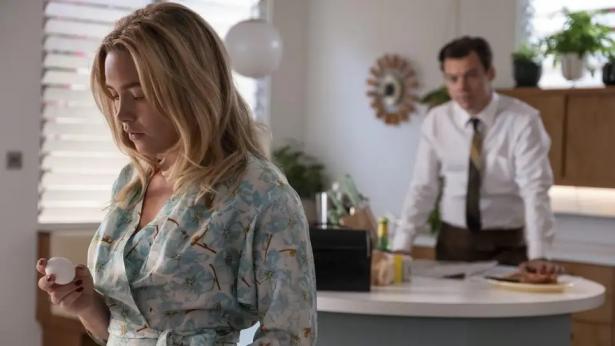film ‘Don’t Worry Darling’ Is the Antidote to TikTokers’ Obsession With Being a Tradwife
WARNING: This article contains spoilers.
Amid the slew of mixed-to-negative reviews Don’t Worry Darling has faced so far, I’ll give it this: Olivia Wilde’s erotic thriller is, to Harry Styles’ point, a movie that feels like a movie. As an exposition-heavy film that initially presents as a glowing tribute to the orgasmic joys of 1950s domestic bliss for women, it’s very well-timed, as DWD premieres in the midst of a viral social media trend of young women romanticizing tradwifery in its ‘50s heyday—which feels vaguely like a horror movie in itself.
This content, primarily on TikTok, capitalizes on Gen-Z’s famed (and justified) antipathy toward capitalism (think: the popularization of the adage, “I do not dream of labor.”) These accounts promote the narrative that feminism scammed women—and that not working outside the home and having a man provide everything for you is empowering.
As feminist journalist Moira Donegan put it, you can tweet to the effect of “Ugh, I don’t want to go to work today” and watch your algorithm transform into “an endless stream of blonde women telling you to give up your life and be a 50s-style housewife to please husband and the Lord.”
If you weren’t a straight, decently wealthy, white man, the 1950s weren’t exactly a glamorous time. Throughout much of the 20th century, a woman couldn’t see a doctor without her husband or father making an appointment for her. Relevant to the plot of Darling, during this era, a housewife could make a single comment that rubbed her husband the wrong way and find herself diagnosed with hysteria and lobotomized, or institutionalized at his request. Gaslighting is a focal point of Darling, to the extent that huge chunks of the script feel directly pulled from viral Tumblr posts I remember reblogging in 2013. However cringe this aspect of the movie might be, its release frankly couldn’t have come at a better time.
When Florence Pugh’s character, a prototypical, all-American housewife named Alice, realizes something is afoot within the confines of the Victory Project (the picturesque desert commune in which she and Styles’ Jack live), we watch how the slightest protest from a tradwife can unravel her life. She’s called “crazy” by everyone around her, including the people who know she’s right. Eventually, her memory gets wiped in a procedure harkening back to a good ol’, ‘50s-era lobotomy. The role of the commune’s creepy doctor, played by Veep’s Timothy Simons, is to gaslight any housewife who starts asking too many questions until she shuts up or disappears. It’s a pretty pointed reminder that this wasn’t exactly a period in history that merits new-wave feminist glorification.
Then, of course, there’s the movie’s ultimate, deeply weird twist: We learn all of this is actually taking place in the modern day, and the world of the Victory Project is a VR simulation. If Jack and Alice’s story is the norm, which isn’t fully clear, it seems in the real world, many of the “husbands” kidnapped or quite literally forced a woman into the simulation—where their memories are wiped and they’re wired to believe their sole purpose is to slavishly wait on their husband and live out a perpetual 1950s domestic fantasy.
And speaking of Darling’s real-life timeliness, modern-world Jack appears to be yet another young man experiencing emasculating “economic anxiety” from losing a job; he’s consequently radicalized into incel-dom by the viral, online teachings of Chris Pine’s “Frank,” who created the Victory Project, and is not-so-loosely based on the far-right, red-meat-guzzling professor Jordan Peterson. Jack is ultimately ~inspired~ to force his (then-girlfriend) Alice into the Victory Project with him when one night, she comes home from a late shift at the hospital and rejects his sexual advances—an allusion to how the core of incel ideology is entitlement to sex, and the belief that women who don’t readily provide it deserve punishment.
To that end, Darling is loaded—arguably overloaded—with warnings: of the enduring perils of ‘50s-era tradwifery; online misogynist radicalization; and perhaps even ever-evolving technologies like, say, the Metaverse, which inevitably come with new ways for women to be abused and entrapped. Much of these messages are woefully underdeveloped, and the movie’s feminist imagery—including copious, glorious cunnilingus—feel a little odd once we realize these depictions of female pleasure are all taking place within a context of captivity.
Despite its shortcomings, Darling elicits plenty of feminist foreboding, and again, certainly benefits from its timing. Its release comes at a moment in which young women are increasingly being socialized to embrace anti-feminist beliefs—who can forget how many of Johnny Depp’s most vocal supporters during his defamation trial were, indeed, young women? The movie also comes amid a culmination of years of political gaslighting: Prior to the recent overturning of Roe v. Wade, women who warned about this outcome were told we were “crazy” and “hysterical.” There’s undeniable catharsis in watching cheesy art that holds up a sexy, unsettling mirror to all of it.


Spread the word